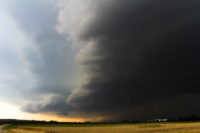Climate News
2024 Storm Season Starts with Intense Storms, Tornado Outbreaks
Twisters touching down in clusters, above-average sea temperatures and increasing median global air temperature get the 2024 storm season off to a busy start

A chain of severe storms blasted multiple states across the nation from the last week of April through the beginning of May; nearly 100 reports of severe weather were reported on May 2 alone. The 2024 Storm Season is off to a wild start.
— Image courtesy of Rawpixel.com
The 2024 storm season has started with a bang, meaning more work for roofing contractors but advancing an unsettling trend of storms becoming more severe and destructive.
A chain of severe storms blasted multiple states across the nation from the last week of April through the beginning of May. Dozens of tornadoes caused extensive damage in the middle of the country starting April 26, wrecking cities and towns in states like Nebraska and Iowa.
Nearly 100 reports of severe weather were reported on May 2, most of which occurred in Texas. On May 3, the National Oceanic and Atmospheric Administration predicted large hail and damaging gusts for parts of the central and southern Great Plains, from south Nebraska to west Texas. The predictions included the potential for tornadoes in west Texas.
Some areas were already reeling from back-to-back tornado outbreaks, including portions of Nebraska, Iowa and Oklahoma. Since May 2, 106 tornadoes have been reported over the central states. Even as recently as May 8, southern Michigan experienced an EF2 tornado, tearing open homes and businesses along an 11-mile path.
Oklahoma saw a powerful and dangerous tornado on April 31 that didn’t spin in the normal direction, which The Weather Channel said happens with only 1% of tornadoes. Another tornado that same day looped backward and re-crossed its previous path. Thankfully, both twisters were over sparsely populated areas, and no injuries or deaths were reported.
Regardless, it is evidence of the growing severity of supercell storms. The Intergovernmental Panel on Climate Change’s Sixth Assessment Report, released in 2021, shows that human-caused rises in greenhouse gases have increased the frequency and intensity of extreme weather events.
“We saw for almost a decade the same cities, the same areas got hit pretty consistently, and in the last three years, we’ve seen a major shift in storm tracks, so we’re seeing different population areas getting hit and part of the state that haven’t been hit before,” said Zach Simmons, vice president at Stronghold Roofing in Oklahoma City. “The new set of customers we’re being introduced to don’t have that experience, or that experience has been from 20 years ago.”
On April 28, tornadoes killed four people in Oklahoma and left thousands without power. The severe weather utterly destroyed buildings and injured at least 100 people throughout the state. The town of Sulphur was hit harder than most, shredding roofs from homes, tossing cars and busses and obliterating downtown buildings.
Simmons said his company takes a different approach to storms, inviting customers to reach out rather than using door-to-door tactics following storms, which has helped set them apart from other contractors.
“A lot of the stuff we’re pushing out prior to these storms is education and storm preparation, dealing with insurance processes, how you stay protected against no-so-great contractors — those that aren’t likened or insured,” he said.
Some contractors, like Tarrant Roofing in the Dallas/Fort Worth area, say they’re experiencing spottier storm coverage. Even with more storms, roofing contractors like Tarrant Roofing have been stepping up their game for customers.
“We like hail, but hail has to be significant enough to do damage. Shingles these days, they build them to last several years, so we are seeing some damage, but I wouldn’t say we’re seeing significant [damage] in all areas,” said D’Sha Jones, marketing manager for Tarrant Roofing. “We educate our people; that’s very important to us, to make sure that we’re putting on quality materials.”
Storm-related insurance claims continue to be a hot-button issue. Ridgeline Roofing, located in Ashland, Ky., has responded to storm calls since early April, when heavy winds and rains battered the city on April 2. The company took to social media urging people affected by the storms to think twice about getting insurance to cover roof damage unrelated to storms.
“For those of you out there who are trying to do this - from the absolute bottom of our hearts: do not call us,” the company said. “Before you pick up that phone and call or message ANY reputable, trusted local contractor and you're considering trying to defraud your insurance company, have a heart and think about the people you're delaying from getting actual help.”
Looking for a reprint of this article?
From high-res PDFs to custom plaques, order your copy today!






